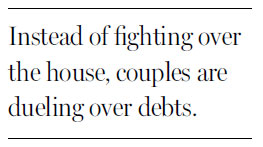Divorces in Spain delayed due to hard times
Updated: 2013-01-06 11:58
By Dan Blefsky(The New York Times)
|
|||||||
|
Esther Fernandez, with her son Yoel and exhusband Gaby Cuadrado, said it took her two years to afford a divorce. Samuel Aranda for The New York Times |

SABADELL, Spain - Selling their house in a depressed market was impossible. Neither husband nor wife could afford a second home. An expensive divorce was out of the question. So Esther Fernandez, 45, and Gaby Cuadrado, 47, stayed together for two more years after she initially wanted to separate.
"I felt trapped," she said.
Mr. Cuadrado felt pushed to the brink of suicide. "Being forced to live with a woman I loved who had rejected me was psychological torture," he said.
They finally divorced in November, after moving to tiny apartments.
Many Spaniards are staying in troubled relationships longer as a result of the nation's economic crisis.
The divorce rate jumped after changes to the divorce law made it easier to split up in 2005, but it has fallen with the crisis in Spain's economy. Last year, the number of divorces dropped 17 percent compared with 2006, according to the Spanish Judicial Council.
"There is no doubt that the crisis is pushing people to stay together," said Jose Maria Redondo, the council's spokesman.
The crisis is not only slowing divorces but also transforming the process. Judges are reducing payments, and spouses have moved from fighting over property to sparring over the critical issue of who assumes debts.
Some couples are literally dividing their homes in two, by sticking tape across the floor. Unable to afford a divorce, other couples live together even as they engage openly in other romantic relationships.
It is worst for jobless couples, said Myka Pedrero, a family psychologist, not just because of the money strains, but because they often spend all day together at home, treading on each others' nerves, she said.
"When people who want to split are forced to stay together it pollutes the whole ecosystem that is the family and drives both the man and the woman crazy," she said.
Even when couples can afford a divorce, the economic crisis has added complications.
Maria Jose Varela, a leading divorce lawyer, said that while in the past spouses would fight over who got to keep the house, now her clients were fighting over who got to get rid of it, because neither wants to be saddled with debt. Post-divorce mortgage sharing agreements have become a new key component of divorce settlements. In court, Ms. Varela said, men are using the economic crisis to reduce alimony payments, and many judges are agreeing.
Ms. Varela's own fees, which range from 200 to 10,000 euros - or about $265 to $13,200 - depending on the size of the settlement, had also been severely truncated, she said. Some women said their husbands were using the bad economic times to blackmail them financially and emotionally into staying in loveless marriages.
Marta Lopez, 31, said that when she demanded a divorce from her husband of four years, he refused and insisted she pay off the mortgage in return for her freedom - something she could not afford after losing her secretarial job. So for a year and half she slept on the couch and ate mostly pasta and rice, until she could afford a divorce lawyer. "It was worth it to get my life back," she said.
Some divorced couples are even moving back in together for financial reasons.
Maria Teresa, a 44-year-old broadcast journalist, divorced in 2008 and moved from Barcelona to Madrid with her two sons. But after the crisis exploded and she lost her job, she decided in 2011 to move back in with her ex-husband, an unemployed art dealer. They pooled their unemployment benefits and rented a two-bedroom apartment for 900 euros a month, putting the savings toward food, school and soccer uniforms for their children.
The week her husband moved in, she said, she could not stop crying. Since they are both jobless and at home, she said she was obsessively inventing situations so she could be alone.
Some Spaniards say the hard times may have one benefit. If the crisis helps preserve the Spanish family by making it harder to divorce, that was no bad thing, said Julian M. Valon, a divorce lawyer who helped write the country's 1981 divorce law.
"If there's something positive about the economic crisis it is that people have less money to fight about than before," he said, "and this could help people to stay together, even through the tough times."
The New York Times
(China Daily 01/06/2013 page10)
